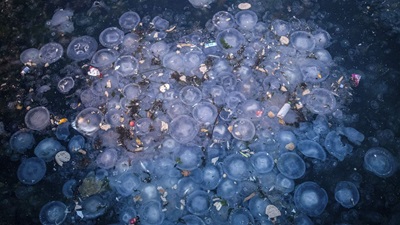Plastic Pollution Is Solvable – If International Negotiators Act Now
The pressure is on countries to find a way forward in the next round of plastic treaty talks

By now many people have heard that plastic particles have been found in the most remote regions of the world – from the deepest ocean trenches to the top of the Himalayan mountains – and in the blood, brains, and placentas of humans.
What people might not know is that the problem is getting worse: Estimates show that without global action, annual production of new plastics will increase by 66 per cent by 2040 and the amount of mismanaged plastic waste could almost double compared with 2019 levels. Given that policymakers worldwide have yet to reach an agreement on how to address this problem, it is urgent that they now step up with thoughtful rules – covering the full life cycle of plastic, from production through to recycling and waste management – to significantly reduce pollution. The good news is that policies and other tools exist to curb mismanaged plastic – which is plastic that’s not in a landfill or recycled or otherwise accounted for – by more than 90 per cent by 2040.
Next month, United Nations member countries will gather in Geneva, Switzerland, for the sixth and potentially final session of the Intergovernmental Negotiating Committee on Plastic Pollution (INC-5.2). The aim of the talks is to finalize an international, legally binding agreement – known as the U.N. plastics treaty – to tackle plastic pollution. If ambitious and far-reaching enough, the treaty could help reduce the amount of plastic released into the environment by seven-fold each year, from 49 million metric tons to about 7 million metric tons by 2040.
At the committee’s previous session (INC-5.1) in Busan, Republic of Korea, in November, a group of negotiators rallied to form an alliance in favour of an ambitious treaty – one that contains global targets to reduce primary plastic polymer production, phases out the most harmful plastic products and chemicals of concern, and provides effective means for implementation.
That commitment was again on display at the U.N. Ocean Conference held last month in Nice, France. The Nice wake-up call declaration – which was signed by ministers from 95 countries – calls for an effective agreement based on a comprehensive approach addressing the full life cycle of plastics. Signatories to that declaration represented all regions of the world and included Cambodia, the Cook Islands, Costa Rica, the European Union, Madagascar, the Philippines, Senegal, and Tuvalu.
As these 95 countries work to build momentum for a comprehensive treaty, attempts by others to weaken the agreement still looms large. Some countries strongly oppose critical aspects of the draft text, including the objective of reducing plastic production worldwide. But to be effective, the eventual U.N. agreement must prioritize reducing the supply of primary plastic polymers. A focus on waste management alone would reduce plastic leakage by only about a third compared with 2020 levels.
With just 9% of plastic waste currently recycled, limiting the treaty to downstream solutions would miss the opportunity to address the problem at its source. This approach would not only undermine the effectiveness of the treaty but also fall short of the U.N. Environment Assembly target to end plastic pollution.
Another key area of discussion is whether the treaty should rely on minimum binding requirements or voluntary approaches, and whether the future Conference of Parties should make decisions by consensus or majority vote. This last aspect will be critical: A majority vote is crucial to strengthening the treaty over time and enabling it to evolve in line with the best available science; a consensus system, on the other hand, could lead to political deadlock if one or more parties holds out.
Pressure is mounting on governments to find a way forward that’s acceptable to a broad group of countries, each with differing priorities and experiences with plastic pollution. Since the draft treaty text was first published in 2023, the proposal has drastically evolved, and many elements such as binding requirements or annexes have been watered down. In Geneva, countries that favour a groundbreaking agreement on plastics must defend a clear mandate and stand strong against any attempt to further weaken the text during the negotiations.
The political will to finalize the world’s first ever plastics treaty is palpable. However, to succeed, the agreement must have strong mechanisms in place. Reducing the production of new plastic, improving product design to minimize environmental and human health impacts, phasing out problematic polymers and chemicals, and putting in place financial provisions to ensure successful implementation while increasing transparency throughout the plastic life cycle could significantly decrease how much waste in generated and ensure that States can make a real impact.
The INC negotiations offer a concrete, tangible way forward out of the worsening plastic pollution problem. Pew urges negotiators and policymakers to rise to the challenge and make the Geneva session a pivotal and historic step in the right direction.
Natacha Tullis works with The Pew Charitable Trusts’ preventing ocean plastics project.







